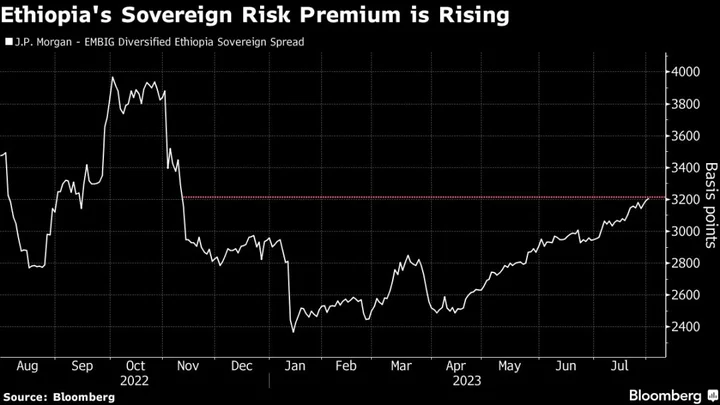
Ethiopia’s Eurobond Under Pressure as Coupon Looms
Ethiopia’s dollar bonds are under pressure amid concerns over the nation’s debt profile, with a long-awaited loan from
1970-01-01 08:00
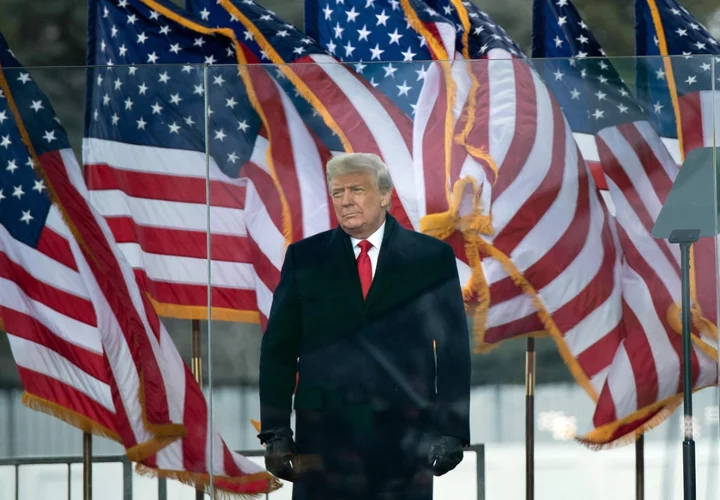
Donald Trump’s latest indictment is a test for America
The latest case of United States of America v Donald J Trump strikes at the heart of a question that has clouded the former president’s time in and out of office: Can he unequivocally lie and use that deceit to influence the outcome of a democratic election, against the will of millions of Americans? An indictment against the former president for his very public plot to overturn the 2020 presidential election is remarkable in that it is not only his third criminal indictment within four months, a historic precedent for this or any former or current president in US history. It also chronicles the alleged actions of a sitting president on his way out to bring American democracy down with him. Mr Trump already is criminally charged in New York City in a case connected to hush money payments to silence stories of his alleged affairs in the lead up to his 2016 election. The US Department of Justice also has charged him with his alleged retention of classified documents after leaving the White House. But the indictment unsealed on 1 August outlines a graver threat. Michael Waldman, president of the Brennan Center for Justice at NYU Law, said the charges “matter beyond the fact that a former president is accused”. “Donald Trump and his co-conspirators tried to overthrow American democracy. They wanted to negate the votes of millions of Americans. They did this using phony claims of voter fraud and rigged elections. These conspiracy theories are still being used to justify changes to voting and election law all over the country. Donald Trump will stand trial,” he said in a statement to The Independent. “The Big Lie will be on trial too.” The indictment outlines the familiar contours of a conspiracy-driven scheme and the violence that followed it, a narrative that members of Congress investigated for more than a year before publishing an 845-page report detailing Mr Trump’s refusal to cede power, regardless of the outcome. That report and countless investigations into the events surrounding January 6 have painted the attack on the Capitol as part of a much-larger effort to preserve a fragile American democracy. Unlike the other indictments against him, the latest charges amount to accusations of crimes committed by a man who president when he allegedly committed them. For months leading up to the 2020 presidential election, then-President Trump routinely and publicly undermined the legitimacy of an election that hadn’t even happened yet, sowing doubt about whether Americans’ votes would be counted at all. But as the indictment alleges in a detailed, chronological accounting of the scheme, the former president was routinely made aware that his statements were false – by two attorneys general, Justice Department officials, an election security chief, his vice president, his campaign, and Republican governors and election officials who voted for and endorsed him. According to the indictment, one senior adviser said the campaign’s legal team “can’t back any” of the former president’s claims. “I’ll obviously hustle to help on all fronts, but it’s tough to own any of this when it’s all just conspiracy s*** beamed down from the mothership,” the adviser wrote, according to prosecutors. Federal prosecutors outlined what, allegedly, happened next, when it became clear Mr Trump was losing: Then-President Trump and his allies conspired with officials in states that he lost to invalidate ballots and use fraudulent electors to cast their electoral college votes on his behalf, relied on the Justice Department to force the plan through, and pressured his vice president to go along with it, before exploiting the violent disruption in the halls of Congress to make another last-ditch attempt to reject the outcome. “It was an attempt to usurp from the people our right to choose our own leaders, our own president, through the electoral college system,” according to Democratic US Rep Jamie Raskin, who served as the lead impeachment manager for Mr Trump’s second impeachment for the events surrounding January 6. “They’re very grave and serious charges, of course, but extremely well anchored in the facts,” he told MSNBC. The resulting four-count indictment accuses the former president of committing three criminal conspiracies while he was still in office. Mr Trump is accused of a conspiracy of “dishonesty, fraud, and deceit” to “impair, obstruct, and defeat” the process of collecting and certifying votes in the states, a conspiracy to obstruct the certification of those votes in Congress, and a conspiracy to deprive the right to vote and have one’s vote counted, a violation of long-standing civil rights law first enacted in the violent aftermath of the Civil War. The indictment also lists six unnamed co-conspirators who are likely to include Trump-connected attorneys and government officials. Mr Trump relied on his “prolific” lies to help organize fake electors in several states to submit false vote certificates to Congress, positioning Mike Pence to oversee a fraudulent certification of those bogus slates of electors on 6 January, 2021, the indictment alleges. The former president also allegedly leveraged the Justice Department to advance the scheme; at one point in the indictment, prosecutors suggest that the Trump administration was willing to deploy the military to crush opposition to his election, if he were to successfully overturn Mr Biden’svictory. Three days before January 6, a co-conspirator believed to be Justice Department official Jeffrey Clark spoke with a deputy White House counsel who had previously warned Mr Trump that “there is no world, there is no option, in which you do not leave the White House”. “Well,” Mr Clark allegedly replied, “that’s why there’s an Insurrection Act.” Following the hours-long siege at the Capitol on January 6, a violent show of force fuelled by Mr Trump’s baseless narrative, his aides and co-conspirators exploited that chaotic delay to pressure Congress to refuse the results for a final time. “We are talking about democracy on the brink, as you read through this indictment,” Alyssa Farah Griffin, a former White House communications director under then-President Trump, told CNN. “It shows how close we got.” The charges are unprecedented in their scope, but the tools to prosecute election interference and voter fraud conspiracies that have deprived Americans’ rights have been in place for more than a century. “Our democracy and our legal system are actually prepared to deal with these kinds of unprecedented situations,” Sean Morales-Doyle, director of the Brennan Center’s voting rights and elections programme, told The Independent. “I think the history is important, because we’re also not at the end of history here.” While he ultimately failed in his efforts, Mr Trump’s narrative of victimisation and “stolen” elections has infected a wide swath of the American public, particularly Republican officials and their supporters. Mr Trump’s rhetoric has persuaded roughly three in 10 Americans to believe the lie that the election was stolen from him. His false and inflated claims, spanning more than a decade, have sowed enough doubt among his supporters to construct the lie of “stolen” and “rigged” elections, animating Republican attempts to challenge results and craft dozens of pieces of legislation to do what Mr Trump failed to do in court and while in office. Since leaving office, the former president has continued a narrative of political persecution as he seeks the 2024 Republican nomination for president, with a reliable mention of “stolen” or “rigged” election in his fundraising messages, on his Truth Social, and on the stages of political conferences and campaign rallies. Mr Trump, who has frequently used projection to accuse his rivals of doing the very things of which he has been accused, now refers to the multiple investigations and indictments against him as politically motivated “election interference” – a charge at the center of his latest indictment. He accuses his rival of “weaponising” the federal government against him – once again, what prosecutors have alleged Mr Trump did to stop Mr Biden from winning the 2020 election. Mr Trump and his defenders argue that the real crime is the unrelated case involving Hunter Biden, and what they allege is a Justice Department coverup to protect him, while they ignore the Trump family history of alleged fraud, self-dealing and enrichment at the public’s expense. Fox News has spent considerable airtime suggesting that the indictments are timed to distract from spurious Republican-led investigations into the president’s son, casting Mr Trump as a victim of his politically motivated rival. The network – less than four months after its historic $787m settlement to avert a potentially devastating defamation trial involving many of the same lies at the center of Mr Trump’s push to overturn election results – immediately got to work to defend the former president as news of the indictment broke. Jesse Watters, who inherited Tucker Carlson’s prime-time slot after he was fired from the network, called the indictment “political war crimes”. Right-wing media pundits claim he was merely acting within his authority to challenge the outcome of the results, or simply using his First Amendment protected rights to reject them, or that he truly believed, despite overwhelming evidence, that the election was stolen from him. “I would like them to try to prove beyond a reasonable doubt that Donald Trump believed that these allegations were false,” lead Trump lawyer John Lauro said on Fox News the night of his indictment. The indictment makes clear that Mr Trump has the right – “like every American” – to say whatever he wants about the election, even to falsely claim that he won. But what he cannot do, prosecutors argue, is weaponize those lies in a conspiracy to overturn the results. “They’re not attacking his First Amendment right,” former US Attorney General Bill Barr told CNN. “He can say whatever he wants. He can even lie. He can even tell people that the election was stolen when he knew better. But that does not protect you from entering into a conspiracy. All conspiracies involve speech, and all fraud involves speech. So, free speech doesn’t give you the right to engage in a fraudulent conspiracy.” With each indictment, the former president has fanned the flames of outrage and suggested that the US faces World War III and imminent violence without his leadership. With news of criminal charges in New York City in March, he demanded widespread protests and called America a “dying” and “third world” country where “leftist thugs” are “killing and burning with no retribution”. “There’s no other way to say it: our nation is teetering on the brink of tyranny,” a campaign fundraising message announced after news of his latest federal charges. On his Truth Social, he compared the current administration to “Nazi Germany in the 1930s, the former Soviet Union, and other authoritarian, dictatorial regimes”. Mr Trump remains the frontrunner for the Republican Party’s nominee in the 2024 presidential race, and by all measures it appears he would not do anything different should he return to the White House. His 2024 campaign agenda builds from his dark vision of American “carnage” from his first moments as president and the four chaotic years that followed. In recent months, he has demanded the executions of drug offenders and human traffickers, considered the “termination” of the US Constitution, pledged national restrictions on abortions and gender-affirming care for trans people, and promised political vengeance and “retribution” for his supporters, offering himself up as a martyr for a movement he inspired. “I’m being indicted for you,” he tells them. Federal prosecutors have already charged more than 1,000 people in connection with the attack on the Capitol on 6 January, 2021. Donald Trump is now one of them. “January 6 and the effort to overturn the 2020 presidential election, together with the first criminal trials of an American president, will now become singularly infamous events in American history,” conservative former federal judge J Michael Luttig said. “These events will forever scar and stain the United States. And they will forever scar and stain the United States in the eyes of the world.” Read More Trump indictment – live: Trump posts ominous video as court arraignment nears for 2020 election charges Eight key revelations from Trump’s January 6 indictment Trump’s election fraud claims were always bogus. Will his history of lies finally catch up to him? Why Trump is charged under a civil rights law used to prosecute KKK terror Trump supporters see latest indictment as proof of a conspiracy to take him down Trump, January 6 and a conspiracy to overturn the 2020 election: The federal investigation, explained Who is Jack Smith? The special prosecutor who just indicted Trump again
1970-01-01 08:00
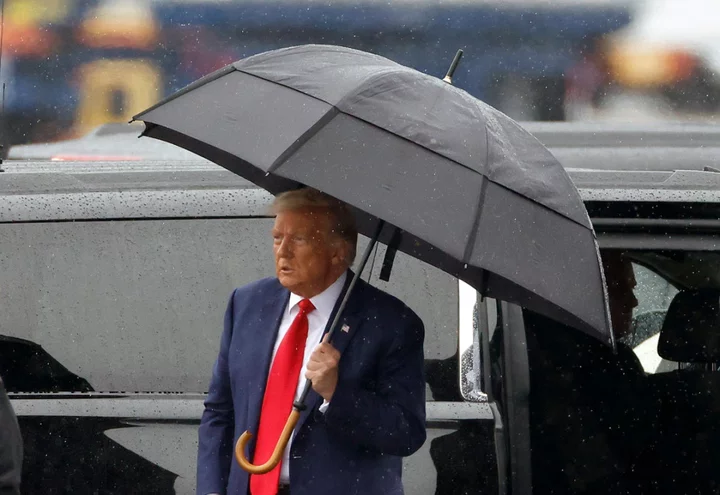
Trump angrily rails against ‘filth’ in Washington DC after arraignment on 2020 election conspiracy charges
Before departing from Washington DC after being arraigned on four federal charges, former president Donald Trump gave quick remarks in which he claimed the capitol had “filth”, “decay” and “broken buildings”. Mr Trump made a quick appearance at the nation’s capital on Thursday so he could appear in federal court to be formally charged with four counts related to his alleged efforts to overturn the 2020 election and subsequent January 6 attack on the Capitol. “This is a very sad day for America,” Mr Trump told reporters before departing on his private plane to New Jersey. The ex-president has continuously claimed he is innocent and that the indictment, brought forth by Special Counsel Jack Smith’s investigation, is a politically-motivated action. But unlike his previous post-arraignment speeches, Mr Trump chose to direct most of his statement toward Washington DC’s environment. “It was also very sad driving through Washington DC and seeing the filth and the decay and all of the broken buildings and walls and the graffiti,” Mr Trump said. “This is not the place that I left. It’s a very sad thing to see it.” Mr Trump spent approximately two hours in Washington DC, most of which was spent inside the E Barrett Prettyman Federal Courthouse. The ex-president pleaded not guilty to the four counts he was indicted on; conspiracy to defraud the United States, conspiracy to obstruct an official proceeding, conspiracy against rights and obstruction of, and attempt to obstruct, an official proceeding. The charges stem from Mr Smith’s probe into Mr Trump’s rhetoric in the days leading up to the January 6th attack on the Capitol, including Mr Trump’s false claims of election fraud. The most recent indictment alleges that Mr Trump knowingly spread lies that there was election fraud in 2020 and he actually won. “These claims were false, and the Defendant knew that they were false. But the Defendant repeated and widely disseminated them anyway – to make his knowingly false claims appear more legitimate, crate an intense national atmosphere of mistrust and anger, and erode public faith in the administration of the election,” the indictment reads. Despite the serious allegations, Mr Trump’s post-arraignment speech made little mention of the implications he is facing. “When you look at what’s happening this is a persecution of a political opponent. This was never supposed to happen in America. This is the persecution of the person that’s leading by very, very substantial numbers in the Republican primary and leading Biden by a lot so if you can’t beat them you persecute them or prosecute ‘em,” Mr Trump said before departing on his plane. Read More Live updates: Trump pleads not guilty at arraignment in 2020 election case What is an arraignment? Here’s what to expect following Trump’s indictment Trump pleads not guilty to federal conspiracy charges in plot to overturn 2020 election Trump rails against ‘filth’ in DC after arraignment on election conspiracy charges Trump ‘irked’ that arraignment judge didn’t call him ‘Mr President’ Former Trump spokesperson sheds light on Melania’s absence from his arraignment
1970-01-01 08:00
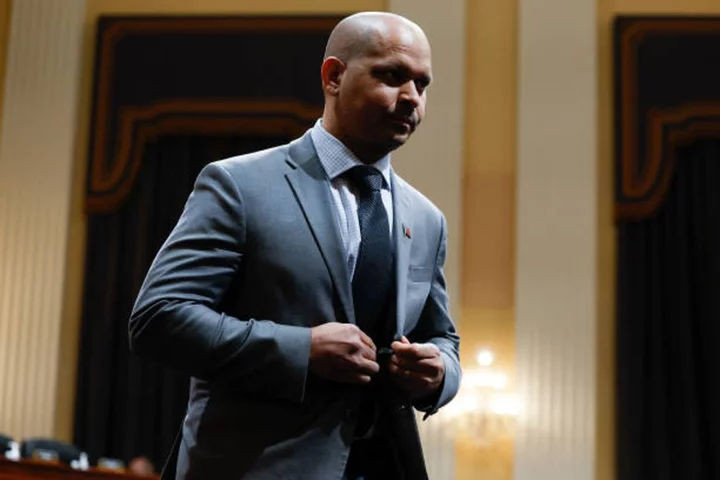
Capitol police sergeant injured on Jan 6 praises Trump arraignment: ‘Our democracy is worth fighting for’
When Donald Trump pleaded not guilty after being arrested and arraigned on Thursday for conspiring to overturn the 2020 presidential election, among those present in the courthouse was Aquilino Gonell. A US Capitol police officer, Mr Gonell resigned in December last year as he sought to continue recovering both “physically and mentally” from the trauma of the Jan 6 insurrection that occurred in 2021. “Our Democracy is worth fighting for,” the retired officer injured in the Capitol riot wrote on X (formerly Twitter) soon after the proceeding. “Not prosecuting is far riskier than having no consequences for the alleged power grab attempts. Justice and the rule of law must win for our democracy to survive,” he said of the former president who was indicted Monday on four charges as part of special counsel Jack Smith’s investigation into the alleged conspiracy surrounding the events from 6 Jan Capitol riot. Describing the incident, he wrote, “[As] Capitol Police sergeant, I found myself defending everything I sacrificed, and our very own democracy when it was threatened by an all out assault by a mob.” “As an American, the events on January 6 were shocking,” he said. “I was attacked by more than 50 people (one way or another) that I know of. I have given testimony to the congressional committee, investigators, prosecutors and the court.” He had earlier last year, while providing testimony before Congress, compared the experience of being at the Capitol on that day to his experience in Iraq with the US Army. “On January 6, for the first time, I was more afraid working at the Capitol than during my entire Army deployment to Iraq,” he had said in prepared remarks. “In Iraq, we expected armed violence, because we were in a war zone. But nothing in my experience in the Army, or as a law enforcement officer, prepared me for what we confronted on Jan 6.” He told legislators how he was punched, pushed, kicked, shoved, sprayed with chemical irritants and “blinded with eye-damaging lasers” – injuries that required multiple surgeries and a six-month medical leave. In a poetic twist of fate, Mr Trump’s latest arraignment brought him to the exact same courthouse where hundreds of people have been tried, convicted and sentenced to terms in prison as long as 18 years for charges in connection with the Jan 6 insurrection. Mr Trump, the man Liz Cheney once credited with having “assembled” and “summoned” members of the mob, is now the latest defendant among them. Mr Gonell was present in court along with two other police officers – Daniel Hodges and Harry Dunn – who defended the Capitol that day. They watched the former president’s arraignment from inside the court. Taking stock of the location’s symbolism where Mr Trump was produced, Mr Gonell said: “The same court in which hundreds of rioters have been sentenced. It’s the same court former President Trump is being arraigned in today for his alleged involvement before, during, and after the siege.” Read More Live updates: Trump pleads not guilty at arraignment in 2020 election case Trump pleaded not guilty. The stakes couldn’t be higher Trump was told not to talk to witnesses in 2020 election conspiracy case. That could be a challenge. Trump appears to stumble over his name and age at arraignment Watch view of the Capitol on day Donald Trump scheduled to be arraigned Trump supporters falsely claim former president faces death penalty
1970-01-01 08:00

Niger media guide
An overview of the media in Niger, including links to broadcasters and newspapers.
1970-01-01 08:00
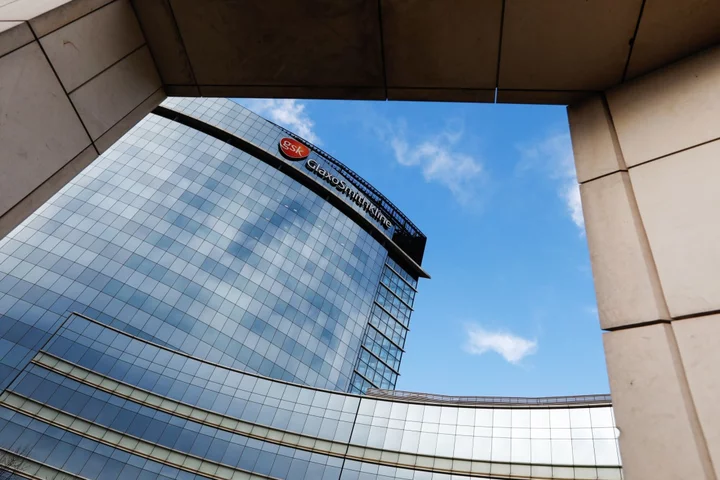
GSK’s Nigerian Unit to Close Down, Return Cash
GlaxoSmithKline Consumer Nigeria Plc, the second-biggest drug firm in the West African nation, will cease operations after its
1970-01-01 08:00

'Turns out it's NOT the end of an era': Taylor Swift extends tour
Taylor Swift has announced additional dates on her 'Eras' tour, with the concert series finally calling to Canada for six shows in Toronto, as well as new gigs in Miami, New Orleans, and Indianapolis.
1970-01-01 08:00
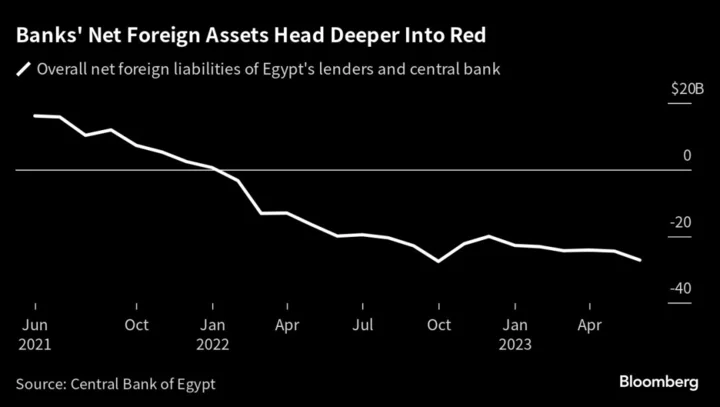
Egypt Surprises With Rate Hike Even as Devaluation Delayed
Egypt unexpectedly resumed its cycle of monetary tightening, seeking to tame inflation that’s running at an all-time high.
1970-01-01 08:00
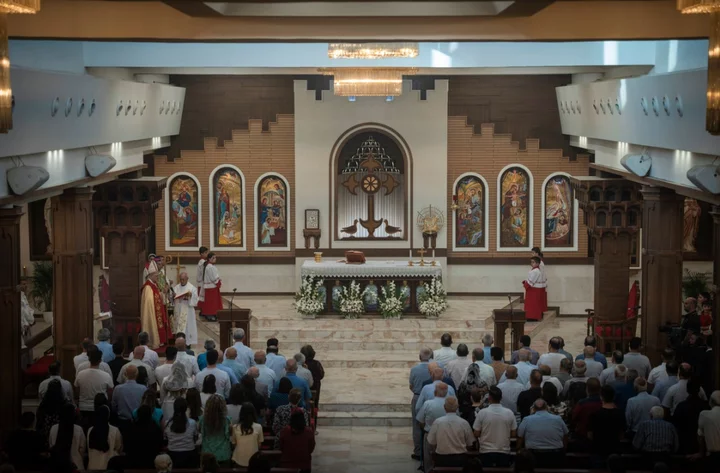
A feud between a patriarch and a militia leader adds to the woes of Iraqi Christians
Iraqi Christians have struggled since the Nineveh plains, their historic homeland of rolling hills dotted with wheat and barley fields, were wrested back from Islamic State extremists six years ago. Although the threat from IS has receded, some towns are still mostly rubble. There are few inhabited homes or basic services, including water. Many Christians have given up and left for Europe, Australia or the United States. Others are trying to follow. Now the shrinking religious minority that was also violently targeted by al-Qaida before the rise of IS has been rocked by yet another crisis in the form of a political showdown between two influential Christian figures — a Vatican-appointed cardinal and a militia leader, with land and influence at the core of the drama. The dispute adds to the woes of Iraqi Christians, who have often felt sidelined in the political order. A 2021 visit by Pope Francis provided a glimmer of hope that quickly faded. Meanwhile, the Christian population has plummeted. The number of Christians in Iraq today is estimated at 150,000, compared to 1.5 million in 2003. Iraq’s total population is more than 40 million. The political tension rose last month when Cardinal Louis Sako withdrew from his headquarters in Baghdad to northern Iraq’s semi-autonomous Kurdish region after Iraqi President Abdul Latif Rashid revoked a decree recognizing his position as patriarch of the Chaldeans, Iraq’s largest Christian denomination and one of the Catholic Church’s eastern rites. Sako said he will not return to Baghdad until his recognition is reinstated. His departure added to the feeling of helplessness among many Christians. “Of course, this affects us psychologically,” said Sura Salem, a Christian social activist in Baghdad. “You feel like a family without a father.” Christians staged a small protest in Baghdad over Sako’s departure, but Salem said “listening to the voice of the Christians is the last concern” of Iraqi leaders. Sako blames a campaign against him by Rayan al-Kildani, a fellow Chaldean Christian who formed a militia called the Babylon Brigades that fought against IS and still patrols much of the Nineveh plains. The group is affiliated with the Popular Mobilization Forces, a collection of primarily Shiite, Iran-backed militias. Its associated political party, the Babylon Movement, won four of five Christian-designated seats in Iraq’s 2021 parliamentary elections. Sako believes al-Kildani is angling to take over Christian endowments and properties. Al-Kildani has made similar allegations about Sako. “I have stood up to this militia and others who wanted to take over what rightfully belongs to the Christians,” Sako told The Associated Press, days after arriving in Irbil to a warm welcome from Kurdish officials. “Of course, no one defends Christians other than the church.” In Baghdad's upscale Mansour neighborhood, al-Kildani was busy building political alliances. On a recent afternoon, several couches in the palatial lobby of his party headquarters were occupied by well-dressed women wearing hijabs, beneath a painting of the Last Supper and a portrait of al-Kildani. One by one, the women entered the inner office, each one emerging with a gift bag. One of the visitors explained that they were political candidates interested in running on al-Kildani’s list in Mosul in December’s provincial elections. After the visitors departed, a smiling and courtly al-Kildani made his entrance. He insisted that he had no role in the withdrawal of the patriarch's decree and dismissed allegations that he was seeking to seize church lands. “I am the son of this church, and it is my duty to respect it, but it is unfortunate when a clergyman accuses someone without proof,” he said. Al-Kildani has accused Sako of selling off church properties, allegations the patriarch denies, and he has filed a lawsuit against Sako alleging slander. But al-Kildani said he is ready to meet with Sako to reconcile. Sako rejected the suggestion. Al-Kildani ”has a militia, and his loyalty is not to the church,” the patriarch said. “He is not a respectable person." The Iraqi president has downplayed his revocation of Sako's recognition as bureaucratic housekeeping, claiming it did not diminish the patriarch’s legal or religious status. The Vatican has remained largely silent. Its embassy in Baghdad said in a statement that the Iraqi Constitution guarantees that the heads of churches can administer church properties. A senior Vatican official, who spoke on condition of anonymity because he was not authorized to comment to the media, said the decree was unnecessary given the constitutional guarantees. He said the Holy See did not want to get involved in the dispute but had invited Sako to tamp down tensions with the Iraqi authorities for the sake of Iraqi Christians. The United States sided with Sako. State Department spokesman Matthew Miller said last month that the U.S. is concerned that Sako’s position "is under attack” by a militia leader who in 2019 was slapped with U.S. sanctions for his alleged involvement in human rights abuses, including cutting off a captive’s ear. Al-Kildani denied the allegations and accused the international community of being ungrateful after his group’s role in the fight against IS. He accused the Kurdish Democratic Party — the ruling party in the Kurdish region and a rival of the Iraqi president's Patriotic Union of Kurdistan Party — and the United States of engineering Sako’s withdrawal from Baghdad for political reasons. For some Christians, the drama is overshadowed by more pressing problems. As Baghdad resident Anan al-Dawi left a sparsely attended Mass on Sunday, her main concern was a recent power outage in the scorching summer heat. She struck a diplomatic tone regarding the feud between Sako and al-Kildani. Although physically absent, she said, Sako “lives in all of our hearts.” As for al-Kildani's group, she said: “I serve the country in my way. You serve it in yours, and they are also serving their country." Back in the Nineveh plains, in the town of Batnaya, patrolled by members of Kildani's militia, Lawrence Sabah owns a small factory where he makes mop handles out of wood imported from Russia. Sabah did not share his opinion on Sako or al-Kildani, but he had other complaints. “There are no services, even the water sometimes doesn’t come, and 70 or 80 percent of the houses were destroyed,” he said. He is hoping to join his parents and siblings, who have resettled in California. Some 8 kilometers (5 miles) to the north, in Kurdish-controlled territory, Raad Ekram owns an electrical supply store in the sparsely populated town of Telskof. When his family was displaced from the village to the city of Dohuk, Ekram believes he got short shrift from both the Iraqi government and the church. “We never saw the patriarch,” he said. “Of course, I don’t accept what happened to him ... and I don’t accept for him to be harmed.” But the patriarch "didn’t do everything he should have done for us.” He is encouraging his children to seek their fortunes abroad. “There’s nothing left in Iraq," he said, "especially for the Christians.” ___ Associated Press writers Nicole Winfield in Rome and Matthew Lee in Washington contributed to this report. ___ Associated Press religion coverage receives support through the AP’s collaboration with The Conversation US, with funding from Lilly Endowment Inc. The AP is solely responsible for this content. Read More Ukraine war’s heaviest fight rages in east - follow live Charity boss speaks out over ‘traumatic’ encounter with royal aide Biden's inaction on death penalty may be a top campaign issue as Trump and DeSantis laud executions On 3rd anniversary, Beirut port blast probe blocked by intrigue and even the death toll is disputed Mega Millions players will have another chance on Friday night to win a $1.25 billion jackpot
1970-01-01 08:00

UAE’s $60 Billion Firm Chases Global Deals Despite Vodafone Snag
Vodafone Group Plc’s biggest shareholder is pushing ahead with an ambitious global expansion strategy, undeterred by a slump
1970-01-01 08:00
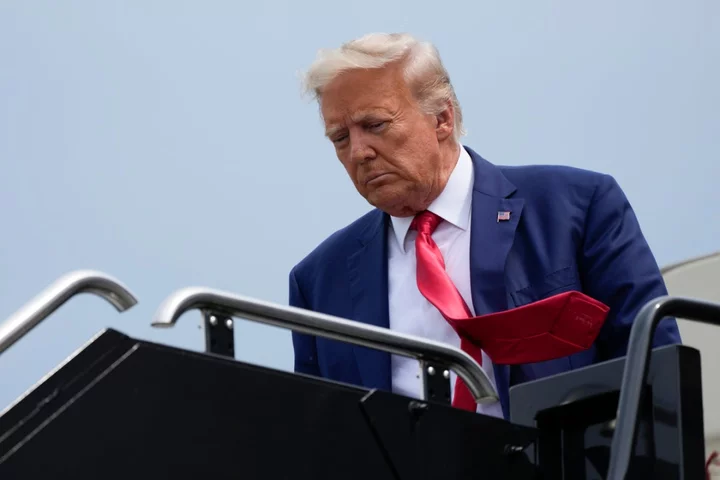
Trump appears to stumble over his name and age at arraignment
Donald Trump appeared to stumble over his words when he was asked to state his full name and age at his arraignment on charges of attempting to overturn the 2020 election. Mr Trump arrived at the E Barrett Prettyman federal courthouse in Washington DC on Thursday where he pleaded not guilty to four criminal counts of an alleged election hoax conspiracy that led to the January 6 riots at the US Capitol. Mr Trump, dressed in his trademark navy blue suit and red tie, entered the courtroom at 3.51pm accompanied by John Lauro, a veteran Washington-based criminal defence attorney, and Todd Blanche, the New York-based lawyer who is leading his defence in the other criminal cases against him. He was made to wait about 25 minutes before the magistrate judge entered the room at 4.15pm, and appeared nervous and fidgety. After attorneys for the government and defence introduced themselves, Mr Trump stood to take his oath from a courtroom deputy. US Magistrate Judge Moxila Upadhyaya then asked the former president to state his full name. “Donald J Trump — John — Donald John Trump,” Mr Trump replied hesitantly. He was then asked for his date of birth, and tripped over his words again. At first, he said “seven seven,” before correcting himself and saying “77”. After explaining his rights to remain silent and to legal representation, and reminding him of the lengthy prison sentence he faces if convicted, Judge Upadhyaya asked Mr Trump if he understood. He replied in the affirmative. Mr Lauro then entered a plea of not guilty on all counts on his behalf. Prosecutors did not seek to detain Mr Trump, and set a date of 28 August for a first hearing before Judge Tanya Chutkan. Mr Trump is not required to attend. In comments to reporters afterwards, Mr Trump described it as a “very sad day” before claiming Washington DC had deteriorated in the two and a half years since he left office. “This was never supposed to happen in America.... if you can’t beat ‘em, you persecute them,” he said. As his motorcade returned to Ronald Reagan Washington National Airport, it was met with a chorus of insults from a small group of protesters. “F** you, terrorist,” one man yelled, according to Wall Street Journal reporter Andrew Restuccia. Earlier this week, Mr Trump was charged with conspiracy to defraud the United States, witness tampering, conspiracy against the rights of citizens, and obstruction of and attempt to obstruct an official proceeding in relation to his attempts to overturn the results of the 2020 presidential election. The indictment also described six unnamed co-conspirators, who have been identified from details contained in the document as New York City Mayor Rudy Giuliani, former Mr Trump lawyer John Eastman, “Kraken” lawyer Sidney Powell, former top Justice Department official Jeffrey Clark, and attorney Kenneth Chesebro. Mr Trump has claimed in a series of unhinged posts to Truth Social that President Biden and the US Department of Justice had “weaponised” the federal government against him. Read More Live: Trump pleads not guilty at arraignment after arrest Trump pleads not guilty to federal conspiracy charges in plot to overturn 2020 election Who is Jack Smith? The special prosecutor who just indicted Trump again
1970-01-01 08:00
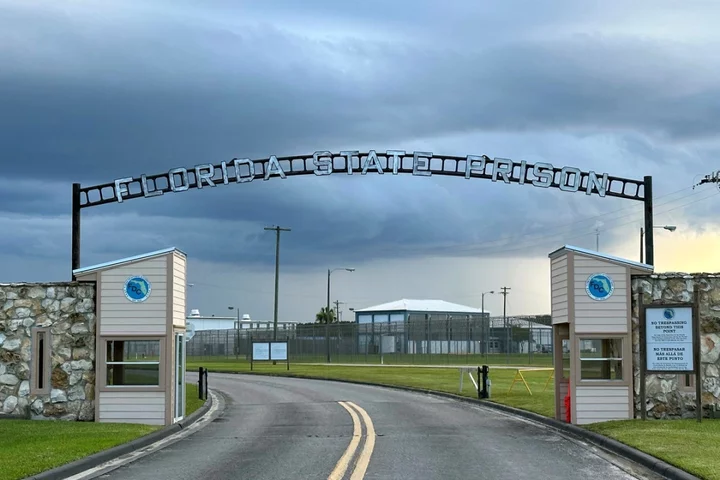
Florida executes man for 1988 murder of nurse who was sexually assaulted, killed with hammer, set on fire
A Florida man who recently dropped all legal appeals was executed Thursday for the 1988 murder of a woman who was sexually assaulted, killed with a hammer, and then set on fire in her own bed. James Phillip Barnes, 61, was pronounced dead at 6.13pm following a lethal injection at Florida State Prison in Starke. Lying on a gurney, Barnes appeared to already have his eyes shut when the curtain was opened for witnesses. He didn't respond when prison officials asked if he had a final statement, and he remained motionless except for breathing for about 10 minutes until that stopped. A doctor then pronounced him dead. The 61-year-old inmate was sentenced to death for the murder of nurse Patricia “Patsy” Miller. It was the fifth execution in Florida this year. One of the victim's siblings, Andrew Miller, witnessed the execution and said he came to remember his sister. “I did not come here to watch someone die. I came here to honor our sister, Patricia Miller,” he told reporters afterward. “No one should live in fear within the safety of their own home. No woman, no child, no animal should have that fear. We did.” Barnes was serving a life sentence for the 1997 strangulation of his wife, 44-year-old Linda Barnes, when he wrote letters in 2005 to a state prosecutor claiming responsibility for killing Miller years earlier at her condominium in Melbourne on Florida’s east coast. Barnes represented himself in court hearings where he offered no defense, pleaded guilty to killing Miller and did not attempt to seek a life sentence rather than the death penalty. Miller, who was 41 when Barnes killed her on April 20, 1988, had some previous unspecified negative interactions with him, according to a jailhouse interview he gave German film director Werner Herzog. “There were several events that happened (with Miller). I felt terribly humiliated, that’s all I can say,” Barnes said in the interview. When he pleaded guilty, Barnes told the judge that after breaking into Miller’s unit, “I raped her twice. I tried to strangle her to death. I hit her head with a hammer and killed her and I set her bed on fire,” according to court records. There was also DNA evidence linking Barnes to Miller’s killing. After pleading guilty, Barnes was sentenced to death on 13 December 2007. He also pleaded guilty to sexual battery, arson, and burglary with an assault and battery. Barnes killed his wife in 1997 after she discovered that he was dealing drugs. Her body was found stuffed in a closet after she was strangled, court records show. Barnes has claimed to have killed at least two other people but has never been charged in those cases. Barnes had been in and out of prison since his teenage years, including time served for convictions for grand theft, forgery, burglary and trafficking in stolen property. In the Miller case, state lawyers appointed to represent Barnes filed initial appeals, including one that led to mental competency evaluations. Two doctors found that Barnes had symptoms of personality disorder with “borderline antisocial and sociopathic features.” However, they pronounced him competent to understand his legal situation and plead guilty, and his convictions and death sentence were upheld. After DeSantis signed the inmate’s death warrant in June, a Brevard County judge granted Barnes’ motion to drop all appeals involving mitigating evidence such as his mental condition and said “that he wanted to accept responsibility for his actions and to proceed to execution (his death) without any delay,” court records show. Though unusual, condemned inmates sometimes don’t pursue every legal avenue to avoid execution. The Death Penalty Information Center reports that about 150 such inmates have been put to death since the US Supreme Court reaffirmed the death penalty as constitutional in 1976. The Florida Supreme Court accepted the Brevard County ruling, noting that no other motion seeking a stay of execution for Barnes had been filed in state or federal court. In the Herzog interview, Barnes said he had converted to Islam in prison and wanted to clear his conscience about the Miller case during the holy month of Ramadan. “They say I’m remorseless. I’m not. There are no more questions on this case. And I’m going to be executed,” Barnes said. Read More Grieving families confront Pittsburgh synagogue shooter at death penalty sentencing Singapore executes third prisoner in just 8 days. What explains this fresh wave of death sentences? Robert Bowers killed 11 in a Pittsburgh synagogue shooting. A jury ruled that he deserves death
1970-01-01 08:00
